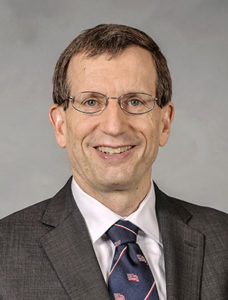 I was honored to preside over TEI’s 68th Midyear Conference in Washington, D.C., and to welcome 600-plus in-house tax professionals to examine the complexities of the Tax Cuts and Jobs Act, along with other technical, policy, and management challenges that confront us. At what is arguably the most consequential moment for in-house tax professionals in more than a generation, it was imperative that this year, perhaps more than in any other, TEI deliver on its educational mission. Based on my own observations and feedback from attendees, I believe we hit the mark and then some. Subject matter experts from more than forty firms shared their insights and perspectives along with their informed prognostications. Although answers for many of the thorniest questions remain elusive, attendees left D.C. far better informed about the challenges that lie ahead regarding how the new statute could affect them and the companies they serve. What-if questions abounded, presenting attendees and practitioners with plenty of opportunities to discuss possible outcomes based on the directions that interpretative guidance might take. To be sure, the Tax Cuts and Jobs Act will be with us for some time, but we have made it out of the gate.
I was honored to preside over TEI’s 68th Midyear Conference in Washington, D.C., and to welcome 600-plus in-house tax professionals to examine the complexities of the Tax Cuts and Jobs Act, along with other technical, policy, and management challenges that confront us. At what is arguably the most consequential moment for in-house tax professionals in more than a generation, it was imperative that this year, perhaps more than in any other, TEI deliver on its educational mission. Based on my own observations and feedback from attendees, I believe we hit the mark and then some. Subject matter experts from more than forty firms shared their insights and perspectives along with their informed prognostications. Although answers for many of the thorniest questions remain elusive, attendees left D.C. far better informed about the challenges that lie ahead regarding how the new statute could affect them and the companies they serve. What-if questions abounded, presenting attendees and practitioners with plenty of opportunities to discuss possible outcomes based on the directions that interpretative guidance might take. To be sure, the Tax Cuts and Jobs Act will be with us for some time, but we have made it out of the gate.
In addition, TEI’s continuing commitment to diversity and inclusion (D&I) was on full display. Our luncheon program, “Diversity and Inclusion: An Opportunity, Not an Issue,” featured Yvonne Metcalfe of Ernst & Young, Cassandra Calvert of Fortive, Wayne Hamilton of Walmart, Don Rath of Synopsys, and Jacqueline Welch of Freddie Mac, all of whom shared their perspectives on embedding D&I concepts in the workplace. The discussion centered on creating work environments that allow employees to bring their best selves to work. The importance of the D&I conversation cannot be overstated. Recognizing that our differences are assets rather than barriers is central to nurturing stronger teams, workplace cohesion, and, ultimately, happier and more fulfilled professionals. I applaud the efforts of our D&I task force to foster greater subject-matter awareness and to develop tools to better understand who we are as a membership organization. In the latter context, we have initiated an effort for members to voluntarily submit demographic data so we can better tailor our educational and networking missions to member needs.
At its March meeting, TEI’s Board of Directors unanimously approved the chartering of TEI’s fifty-seventh chapter, the Nevada Chapter. The efforts of the Chapter’s “in-formation” leaders were exceptional. By attracting members from the travel, construction, transportation, and hospitality industries, the Nevada Chapter has a strong foundation on which to build. In addition, the topical coverage of its “in-formation” meetings and the ability to attract outstanding instructors is a further indication of what the future holds for TEI’s newest chapter.
I was honored to visit the EMEA Chapter and participate in its spring meeting in Brussels, which was titled “The Emerging Importance of Indirect Taxes.” I had the opportunity to introduce the Career Corner panel, a discussion led by tax professionals from PwC and Pure Search that focused on the profile of the in-house tax executive of the future and how indirect tax will affect that profile. The dialogue was thoughtful, and I know attendees benefited. This meeting brought home to me the continuing importance of TEI’s focus on expanding the scope of its membership. I was proud to join my colleagues, and I thank them for the courtesies they extended to me. I also thank them for their continued advocacy efforts this past year, including several submissions on indirect tax and value-added tax.
Finally, allow me to acknowledge my executive committee for their efforts to lead our ongoing projects and initiatives. Although it is always a bit risky to single out one group or person over another, permit me to recognize three. First, the Board composition task force, under the leadership of Jim Silvestri, senior vice president, finished revising the rules regarding the Board service terms of past international presidents. Our PIPs are an invaluable resource and, commencing in 2018 and subject to proxy approval, the decision to extend their Board service to the six years following their presidential terms reflects the Institute’s respect for their contributions. PIPs who currently serve on the Institute’s Board will continue to do so. Second, the two-year effort of the nominating committee task force and its leaders, Marcus Shore and Rita Makaris, has been outstanding. Their thoughtful analysis of TEI’s current procedures and their detailed recommendations for modifications offer the Institute a clear path forward. Last, a special thanks to Kathy Castillo and the social responsibility task force for developing a menu of options that will allow chapters to become engaged with their communities and, in particular, through the local branches of the Volunteer Income Tax Assistance (VITA) program. If your chapter did not participate this year, consider planning now for next year as a way to give back to the community. For more information, please contact Amelia Dalton at [email protected] or 470.639.2864 to address your questions and obtain contact information.
Warm regards,
Robert L. Howren
TEI International President




